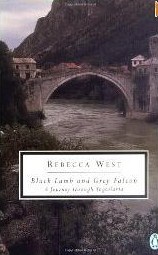Rebecca West
Black Lamb and Grey Falcon. A Journey through Yugoslavia

There is no way this book is not a classic. People who don't appreciate it simply haven't read it or are too prejudiced. Its 11 hundred marvelous pages are full of wisdom, historical accounts, relevant personal experiences, wit, humor, love of literature and personal humility. Despising it is a suicide of the intellect.
Rebecca West must have been a one of a kind woman, understanding and forgiving. She dwells on all topics through this travel book. There are passages that are so interesting and so well written that should earn for her a place among the best writers in the English language.
I'd like to chose two excepts from this nice Penguin Classics edition. One is a humoristic and down-to-earth rationalization of xenophobia:
'She was the gentlest and sweetest of women and for that reason had developed a most peculiar form of hysteria. Perhaps because of her experience as a tiny child in the war she was a true xenophobe, she could not imagine anything more disgusting than a member of another race than her own. ut she did not like to feel anything but love for her fellow-creatures, so she transformed her loathing for them into a belief that they exude powerful and most unpleasant odours.. This belief made her life as a chambermaid an extraordinary olfactory adventure, for to this hotel there came people of all nationalities. [...] The Hungarians seemed to her to have a strong smell, which, however, was not unpleasant, only extremely different from the smell a human being ought to exhale. But the Germans and Austrians were definitely very gross in her nostrils, and the French smelt wicked and puzzling, as I imagine a chemist's shop might to a country woman who knew the uses of hardly any of the articles it exhibited.'
Or this one:
'There are those who sourly remark that Bolshevism was made in such rooms. It is not true. The Russian exiles who were responsible for that sat on unmade beds in flats as untidy as Versailles or any medieval castle. They were the powerful people who never tidy up, who only happened for the moment to be out of power. But those who live in these wept and garnished rooms wish only to serve. In the hereafter they shall be saved when all the rest of us are damned.' Eloquent, isn't it?
And what about this almost mystical passage:
'In too many Western pictures Christ looks as if He were wholly dying, and as if He were making an unmanly fuss over it considering His foreknowledge of the Resurrection. But in all these Macedonian frescoes death is shown working on the body that is bound to the spirit of Christ, wringing the breath out of the lungs as a laundress wrings water out of a shirt, taking the power out of the muscles and nerves like a dentist drawing a tooth whose roots drive down through the whole body. There is demonstrated that separateness of the flesh which Proust once noted, in a passage which describes how we think in our youth that our bodies are identical with ourselves, and have the same interests, but discover later in life that they are heartless companions who have been accidentally yoked with us, and who are as likely as not in our extreme sickness or old age to treat us with less mercy than we would have received at the hands of the worst bandits.'
Must be read slowly, like a good wine.
